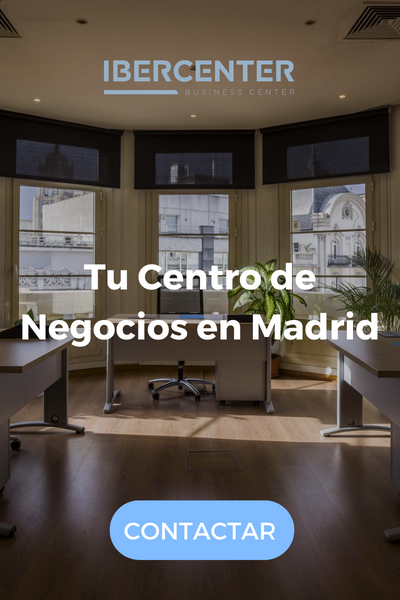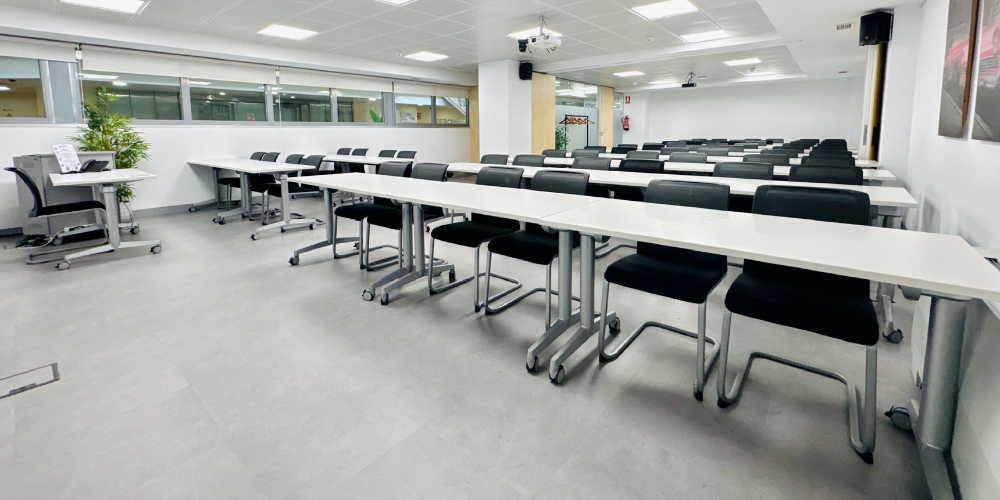In an increasingly competitive business world, where margins are tightening and economic uncertainty seems to be the norm, optimising costs has become a top priority for businesses of all sizes. Large corporations, small and medium-sized businesses, freelancers and startups are all scrutinising every part of their budget. The goal is not only to survive in the market, but to grow and stay relevant, even in difficult times.
The current situation leaves no room for improvisation. Inflation, rising energy costs and digitalisation demands have caused many businesses to experience a skyrocketing operating costs. Added to this is the need to adapt quickly to a constantly changing environment, where traditional offices no longer always respond to new demands for flexibility, mobility and savings. In this context, business owners are looking for solutions that allow them to reduce costs without compromising productivity or the quality of their work. This is where flexible workspaces have gained prominence as an alternative that is not only efficient, but also strategic.
Flexible workspaces represent a completely different way of understanding the work environment. Compared to traditional models, which often involve long contracts, high initial costs and constant maintenance, these spaces offer a much more adaptable approach to the real needs of each business. Companies no longer have to worry about aspects such as furniture, infrastructure maintenance or supply management. Everything is included in a single service that adjusts to the budget and the moment of each project.
The popularity of these solutions is no coincidence. On the one hand, they allow businesses to focus exclusively on their objectives, eliminating logistical concerns. On the other, they encourage a smarter use of resources by avoiding unnecessary expenses. Instead of maintaining oversized or underused offices, companies can adjust their space to their real needs at any given time. In addition, the fact that these spaces are located in prime locations, such as city centres, adds strategic value. Not only do they project an impeccable professional image, but they also facilitate access to clients, partners and suppliers.
What are flexible workspaces?
Flexible workspaces have burst onto the corporate scene as an innovative response adapted to the needs of today’s companies. It is a concept that redefines the way we understand work environments, moving away from the rigid and static model of traditional offices to offer dynamic, versatile solutions geared towards savings and efficiency. But what does this term really mean and what makes them so attractive for companies, freelancers and startups?
Essentially, flexible workspaces are those that offer an adjustable work environment, both in terms of size and amenities, without requiring long-term commitments or significant upfront investments. Unlike traditional offices, which often involve long leases, high fit-out costs and constant maintenance by the company, flexible spaces include all the amenities needed to get started from day one.
From furniture to advanced technology, reception services and even access to meeting rooms, everything is designed so that professionals can concentrate exclusively on their core business.
One of the most notable aspects of these spaces is their ability to adapt to the changing needs of businesses. If a company needs to temporarily expand its team or reduce its size during a certain phase, a flexible space allows these adjustments to be made without complications or penalties. This level of adaptability contrasts sharply with traditional offices, which are often oversized or, in other cases, insufficient to meet the needs of a growing business.
For example, an entrepreneur who needs to work in a quiet environment can opt for a private office in a business center, where they will have access to personalized services such as call reception and messaging. A growing startup can use a meeting room to present its project to investors or strategic partners, enjoying a modern and technologically prepared environment. Even a smaller team, made up of freelancers collaborating on a joint project, can find in coworking an ideal solution to work together without making a long-term commitment.
Ultimately, flexible workspaces not only offer a practical solution to the current needs of companies and freelancers, but also open the door to new ways of working. They reflect a change in mentality, in which the work environment adapts to the professional, and not the other way around. They provide freedom, efficiency and impeccable infrastructure, all in strategic locations that allow businesses to stand out and grow in an increasingly demanding market.
Economic advantages of flexible workspaces
In today’s environment, where resource optimization is key to ensuring the sustainability and growth of any company, flexible workspaces are positioned as a solution that combines savings, comfort and efficiency. One of their main strengths lies in the ability to significantly reduce the fixed costs associated with traditional work environments, an aspect that can make a difference for companies of any size.
One of the biggest headaches for companies that opt for conventional offices is the high cost of rent. These traditional formulas usually require long-term commitments and a considerable initial investment in conditioning the space. From furniture to air conditioning systems, including the installation of technological networks, these initial expenses can blow the budget before even starting work. Flexible workspaces, on the other hand, eliminate this problem at its root.
Everything you need to get started is included right out of the box, allowing businesses to focus on their goals without having to incur unnecessary costs.
In addition to rent savings, there are other hidden costs that many companies don’t notice until it’s too late: utilities, maintenance, cleaning, repairs… In a traditional model, all of this usually falls directly on the tenant, adding a constant and sometimes unpredictable financial burden. Flexible workspaces solve this problem by including all of these services within a fixed rate. Access to electricity, water, high-speed internet, air conditioning and cleaning services are managed in an integrated manner, allowing absolute control of monthly expenses and avoiding unpleasant surprises in the budget.
Another aspect that makes them especially attractive is contractual flexibility. In a world where circumstances can change in a matter of months, committing to a multi-year lease can be a considerable risk. Flexible spaces take that pressure off, offering short- and medium-term options that fit the exact moment each business is experiencing. If a company needs to expand or downsize, it can do so seamlessly and without penalty. Not only does this provide peace of mind, it also allows resources to be matched to actual needs, maximizing operational efficiency.
As if that were not enough, these spaces include services that, in other cases, would require hiring additional staff or using external companies. From receptionists who manage calls and correspondence, to advanced technological systems that guarantee connectivity and security, every detail is designed to facilitate the day-to-day running of companies. This means considerable savings not only in economic terms, but also in terms of time and effort, since entrepreneurs can delegate these operational tasks and focus exclusively on growing their business.
Flexible workspaces are not just a financial relief; they are also a strategic tool that allows companies to operate smarter. In an environment where agility and the ability to adapt to change are essential, this solution offers a perfect balance between cost and value, helping businesses to move forward without the constraints of traditional models. It is an investment in efficiency, with an immediate return that translates into less expenses, more peace of mind and an environment fully prepared to face the challenges of the present and the future.
Additional benefits that go beyond savings
Flexible workspaces not only stand out for the economic savings they offer, but also for a series of additional benefits that make them a strategic tool for companies and professionals. These spaces go far beyond being a place to work; they are environments designed to boost productivity, facilitate key connections and, ultimately, help companies grow in an increasingly competitive environment.
One of the aspects most valued by those who opt for this model is the direct impact it has on productivity. The adapted services offered by flexible spaces allow professionals to focus on what is really important: their work. From the availability of fully equipped meeting rooms to advanced technology such as high-speed networks and communication systems, every detail is thought out to ensure that everything works without interruptions.
Eliminating logistical concerns, such as managing supplies or maintaining space, results in an environment where people can work more focused and efficiently. Additionally, having support staff, such as receptionists and administrators, allows operational tasks to be delegated that, in a traditional environment, could consume valuable time.
Another of the great attractions of flexible workspaces is the possibility of accessing premium locations without assuming the high costs that are usually associated with them. Having an office in central and strategic areas, such as the main business areas of large cities, is an advantage that brings much more than prestige. These locations not only facilitate the connection with clients and suppliers, but also improve comfort for teams, who have nearby public transport and a wide range of services around. Being in a privileged location reinforces the image of any company and generates a positive impression for both business visits and important meetings, something that can be decisive in key negotiations and agreements.
However, perhaps one of the most interesting aspects of flexible spaces is their ability to foster networking and business synergies. Sharing space with other professionals and companies is not just a matter of physical proximity; it is an opportunity to establish relationships that can translate into new collaborations, joint projects and even strategic alliances.
These environments exude a dynamic and creative atmosphere that encourages the exchange of ideas and experiences. Often, the most valuable contacts are not in an address book, but just a few meters away, and a simple chance encounter in the break room can lead to unexpected opportunities.
The added value of these spaces is therefore not limited to savings and functionality. They represent a new approach to how to work, a model that understands the current needs of companies and addresses them in a comprehensive manner. They are spaces that not only allow for greater comfort in operating, but also for sustainable and strategic growth, with tools and opportunities that can make a difference in the market. Opting for a flexible space is not just an operational decision; it is an investment in the future of any project or company that aspires to evolve and stand out in an increasingly demanding environment.
Keys to choosing the best flexible workspace
Flexible workspaces not only stand out for the economic savings they offer, but also for a series of additional benefits that make them a strategic tool for companies and professionals. These spaces go far beyond being a place to work; they are environments designed to boost productivity, facilitate key connections and, ultimately, help companies grow in an increasingly competitive environment.
One of the most valued aspects by those who opt for this model is the direct impact it has on productivity. The adapted services offered by flexible spaces allow professionals to focus on what is really important: their work. From the availability of fully equipped meeting rooms to advanced technology such as high-speed networks and communication systems, every detail is thought out to ensure that everything works without interruptions. The elimination of logistical concerns, such as supply management or space maintenance, translates into an environment where people can work with greater concentration and efficiency. In addition, having support staff, such as receptionists and administrators, allows operational tasks to be delegated that, in a traditional environment, could consume valuable time.
Another of the great attractions of flexible workspaces is the possibility of accessing premium locations without the high costs usually associated with them. Having an office in central and strategic locations, such as the main business areas of major cities, is an advantage that brings much more than prestige. These locations not only make it easier to connect with clients and suppliers, but also improve convenience for the teams, who have public transport nearby and a wide range of services in the surrounding area. Being in a prime location enhances the image of any company and creates a positive impression for both business visits and important meetings, which can be decisive in key negotiations and deals.
However, perhaps one of the most interesting aspects of flexible spaces is their ability to foster networking and business synergies. Sharing space with other professionals and companies is not just a matter of physical proximity; it is an opportunity to establish relationships that can lead to new collaborations, joint projects and even strategic alliances.
In these environments there is a dynamic and creative atmosphere that invites the exchange of ideas and experiences. Often, the most valuable contacts are not in a diary, but just a few metres away, and a simple chance encounter in the break room can lead to unexpected opportunities.
The added value of these spaces is therefore not limited to savings and functionality. They represent a new approach to working, a model that understands today’s business needs and addresses them holistically. They are spaces that not only allow you to operate more comfortably, but also to grow in a sustainable and strategic way, with tools and opportunities that can make a difference in the market. Opting for a flexible space is not just an operational decision; it is an investment in the future of any project or company that aspires to evolve and stand out in an increasingly demanding environment.
Why our flexible spaces in Madrid?
At Ibercenter we know that choosing the right workspace is a crucial decision for any company or professional. It is not just a matter of finding a place to develop the activity, but to have an environment that adds value, that is designed to facilitate the day to day and that contributes directly to the success of each project. That is why our flexible spaces in Madrid are not simply offices or work rooms; they are solutions designed in detail to respond to the real needs of those who place their trust in us.
With more than 25 years of experience in the sector and privileged locations in the heart of the capital, we offer something that goes beyond a physical space: we provide a comprehensive service that combines functionality, exclusivity and flexibility. Our centres, located in Azca, Gran Vía and Velázquez, have been designed to project the professional image that every company deserves. We understand that location is not just another detail, but a strategic factor that can make the difference when it comes to attracting clients, closing deals or simply enjoying convenient and efficient access to the workplace.
Every corner of our spaces has been designed to adapt to the different needs that may arise. From fully equipped private offices for those seeking privacy and concentration, to shared areas that encourage collaboration and networking, to meeting and training rooms that offer everything you need for events, presentations or important negotiations.
The best of all is that, as we are flexible spaces, we adapt to what each client needs at any given moment. We know that businesses change and grow, and that’s why we offer the possibility of expanding or adjusting spaces without complications, always with maximum comfort.
But what really sets us apart is not only the quality of our facilities, but the service we offer. At Ibercenter we make sure that our clients can focus on what really matters: their business. We take care of everything else. From an administrative team that handles calls under the company’s name to advanced technological services that guarantee impeccable connectivity, our aim is to make day-to-day operations as easy as possible. Every detail counts, and we’re here to make sure nothing goes wrong.
Choosing our flexible spaces in Madrid is not just a question of location or design. It is a commitment to peace of mind, comfort and the confidence of having a partner who understands the needs of the business world. Our commitment is to offer much more than just a place to work; we want to be a real support for those who are looking for an environment that allows them to move forward, innovate and achieve their goals. At Ibercenter, we take care of everything so that all you have to worry about is growing your business.
Conclusion
In an ever-changing business world, flexibility is not just a trend, it is a necessity. Companies that choose to adapt and optimise their resources find in flexible workspaces a solution that combines savings, efficiency and opportunities for growth. This model not only reduces operating costs by eliminating the compromises associated with traditional offices, but also offers an environment adapted to the demands of today: connectivity, comprehensive services and strategic locations.
All this translates into a tool that not only optimises the operation of any business, but also boosts its competitiveness in the market.
Investing in a flexible workspace means gaining peace of mind and agility. Without worrying about details such as facilities maintenance, supply management or technology infrastructure, companies can focus exclusively on what really matters: achieving their goals.
In addition, having premium locations and tailored services not only enhances the professional image of any business, but also facilitates key connections with customers, suppliers and strategic partners. This approach allows for growth without the constraints of traditional models, tailoring space to the specific needs of each stage, providing a strategic advantage that can make a difference in increasingly demanding markets.
At Ibercenter, we have been helping companies of all sizes make the leap to this smarter way of working for more than 25 years. We know that every customer is unique, so we offer solutions that are perfectly tailored to their specific needs. From private offices to shared areas to meeting rooms equipped with the latest technology, we provide our clients with much more than just space: we give them the tools they need to grow and thrive.
All of this is accompanied by a professional team that is responsible for facilitating the day-to-day running of the business, answering calls, handling correspondence and ensuring that everything runs smoothly.
Madrid is a city full of opportunities, and our spaces are strategically located in the heart of its business activity, in areas such as Azca, Gran Vía and Velázquez. From here, we offer you not only a place from which to operate, but a dynamic environment that fosters connection, innovation and growth. If you are looking for a way to reduce costs without sacrificing quality or professionalism, Ibercenter has the perfect solution for you.
Take the step towards a working model that combines flexibility, efficiency and savings. Find out how our spaces can make a difference to your business and start enjoying all the benefits of working with us. We’re here to help you grow, taking care of everything else. At Ibercenter, growing together is not just a motto, it’s our mission.




